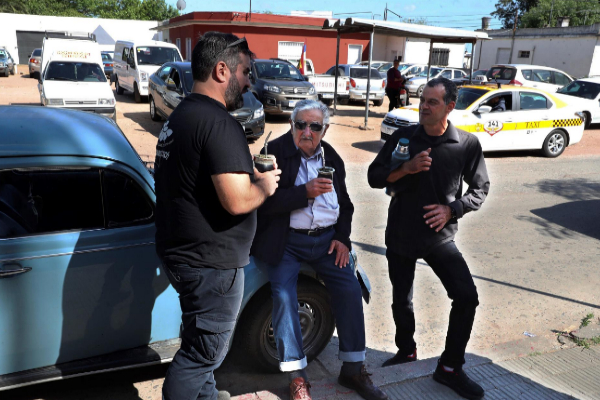- Argentina: Kirchnerism seizes the new Argentine Government
- Graphic: Political Blocks in Latin America
- Politics: The resignation of Evo, a jug of cold water for Latin American progressivism
Uruguay will move a new card today in the increasingly turbulent South American political domino. If in Argentina, the opposite bank of the Río de la Plata, an alliance with left-wing aspirations is prepared to assume power, in the smallest country in South America everything indicates that the elections will end 15 years of governments of the Frente Amplio. The coalition of lefts accuses a strong erosion of power and could be displaced by the National Party, a center-right coalition that postulates Luis Lacalle Pou and also includes social democrats.
Interestingly, it is not the economy that is the main reason for Lacalle Pou's probable triumph over Daniel Martínez , the candidate of the Frente Amplio, in the elections that call 2.7 million voters. Although the economy has been growing steadily since 2003 and has slowed recently, Uruguayans' great concern is insecurity: the homicide rate rose 45 percent between 2017 and 2018 , something unprecedented in the history of a country traditionally considered a social oasis and an example of citizenship in the region.
"Uruguay is fed up with rulers who are never to blame for anything, and they always make excuses for the slightest problem," said Lacalle Pou, 46, in his campaign closing ceremony. Son of Luis Alberto Lacalle Herrera, president between 1990 and 1995, the candidate of the National Party managed to form a coalition of five parties in the face of the elections and she joined both the historic Colorado Party, with soft social-democratic dyes, as the new Cabildo formation Open, led by former Army chief Guido Manini Ríos.
The history of Manini Ríos serves to understand the profound political changes Uruguay has been experiencing: the general was removed from office by the current president, Tabaré Vázquez, earlier this year, after expressing a strong questioning of the role of Justice in the processes for human rights violations during the military dictatorship that ruled the country between 1973 and 1985. Manini soon became a strong political phenomenon and was fourth in the elections of October 27, with 11 percent of the vote. Martinez won that first round with 39 percent, followed by Lacalle Pou with a 29 and Ernesto Talvi, of the Colorado Party, with 12.
Both Talvi and Manini signed a support pact for Lacalle Pou weeks ago, and the surveys have consistently pointed out that Martinez, former mayor of Montevideo, has not found how to reverse the situation and will be overcome clearly. The candidate is also being treated with no excessive affection by José Mújica, former president of the country between 2010 and 2015 and exponent of the most left wing of the heterogeneous Frente Amplio. "No president can make a damn if he does not have a political force to support him," Mújica launched in the final stretch of a campaign in which he was distanced from Martinez. The candidate was not taken by the words of a politician who retains a high degree of popularity and owns a strong symbolic capital: "Pepe is unimputable. Pepe is Pepe."
That the center right returns to power in Uruguay implies that the left turn, with which many in the region dreamed in recent months, will not materialize. That includes Alberto Fernández, Argentine president as of December 10, who crossed the Río de La Plata to intervene in the campaign and support Martínez, something that was not well seen in the National Party, which has the blockade in memory of a bridge that joins both countries during the Kirchnerist governments.
If Lacalle Pou wins, the South American center-right bloc will be consolidated , which already includes Brazil, Chile, Paraguay and Colombia. It remains to be seen what will happen in the parliamentary elections of Peru in January, as well as the political evolution of Bolivia, also called to the polls, and the constituent assembly next year in Chile, a country at the height of social effervescence, as well as Ecuador and Colombia. Venezuela, it is known, is a case as special as it is tremendously influential in the political mood of the region.
According to the criteria of The Trust Project
Know more- Uruguay
- Colombia
- Chile
- Venezuela
- Alberto Fernandez
- Argentina
- Bolivia
- Brazil
- Ecuador
- Peru
ArgentinaThe resignation of Evo, a jug of cold water for Latin American progressivism
Wide Angle From Chile to Iraq: the new foci of global discontent
Latin America The peaks of Puebla and Lima stage the pulse for Venezuela in the region

